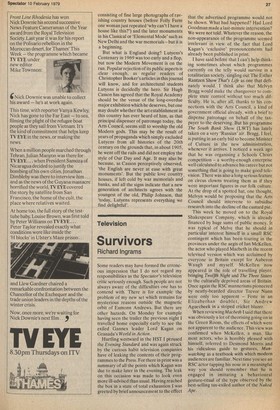Television
Survivors
Richard ingrams
Some readers may have formed the erroneous impression that I do not regard my responsibilities as the Spectator's television critic seriously enough. Such people are not always aware of the difficulties one has to contend with. There is for example the problem of my new set which remains for mysterious reasons outside the magnetic orbit of Eamonn Andrews. But there are other hazards. On Monday for example having seen the trailer the previous night I travelled home especially early to see the exiled Gannex leader Lord Kagan on Granada's World in Action.
Hurtling westward in the HST I perused the Evening Standard and was again struck by the curious habit television companies have of leaking the contents of their programmes to the Press. For there in print was a summary of all the points which Kagan was due to make later in the evening. The leak on this occasion was made to look even more ill-advised than usual. Having reached the box in a state of total exhaustion I was greeted by brief announcement to the effect that the advertised programme would not be shown. What had happened? Had Lord Goodman made a last-minute intervention? We were not told. Whatever the reason, the non-appearance of the programme seemed irrelevant in view of the fact that Lord Kagan's `exclusive' pronouncements had already been published in print.
I have said before that I can't help thinking sometimes about which programmes currently on the telly would survive in a totalitarian society, singling out The Esther Rantzen Show That's Life as one that definately would. I think also that Melvyn Bragg would make the changeover to complete state control without too much difficulty. He is, after all, thanks to his connections with the Arts Council, a kind of government official already, with a brief to dispense patronage on behalf of the taxpayer to the deserving. But his programme The South Bank Show (LWT) has lately taken on a very 'Russian' air. Bragg, I feel, is putting in an early bid to become Minister of Culture in the new administration, whenever it arrives. I noticed a week ago that he was organising a Schools Choirs competition — a worthy-enough enterprise well calculated to advance his career but not something that is going to make good television. There was also a long serious feature on circus clowns treating them as if they were important figures in our folk culture. At the drop of a spotted hat, one thought, Melvyn would be proposing that the Arts Council should intervene to subsidise research into the decline of the custard pie.
This week he moved on to the Royal Shakespeare Company, which is already financed by huge sums of public money. It was typical of Melve that he should in particular interest himself in a small RSC contingent which has been touring in the provinces under the aegis of Ian McKellen, the actor who played Macbeth in the recent televised version which was acclaimed by everyone in Britain except for Auberon Waugh and myself. McKellen now appeared in the role of travelling player, bringing Twelfth Night and The Three Sisters to the culturally deprived areas of Britain. Once again the RSC mannerisms pioneered by neatly-bearded director Trevor Nunn were only too apparent — Feste in an Elizabethan doublet, Sir Andrew Ague cheek in a striped cricket blazer.
When reviewing Macbeth I said that there was obviously a lot of theorising going on in the Green Room, the effects of which were not apparent to the audience , This view was confirmed when McKellen, a man, like most actors, who is horribly pleased with himself, referred to Desmond Morris and his ridiculous guide to gestures, Manwatching as a textbook with which modern audiences are familiar. Next time you see an RSC actor tapping his nose in a meaningful way you should remember that he is engaged in imitating a behavioural gesture-ritual of the type observed by the best-selling tax-exiled author of the Naked Ape.


































 Previous page
Previous page